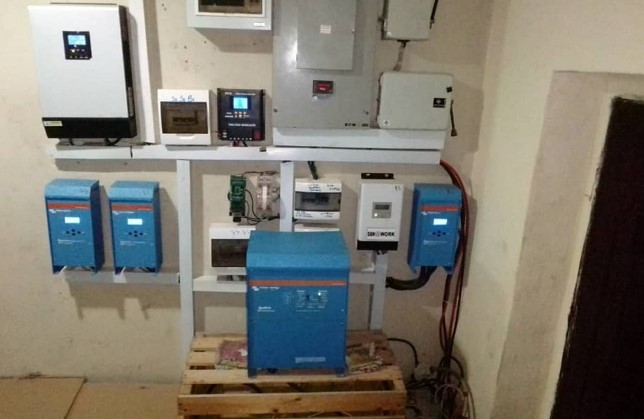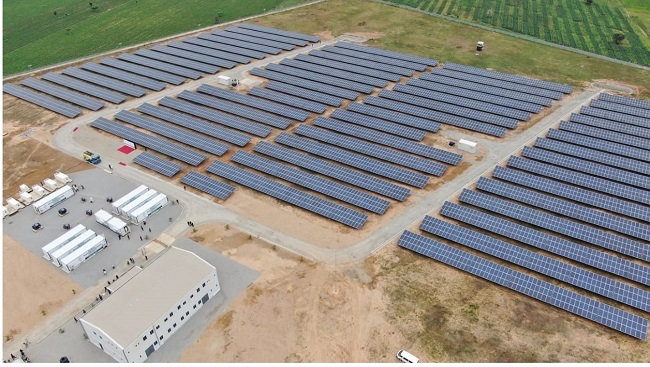“Everybody is tired of NEPA – their service is poor and the estimated billing is ridiculous,” Olufemi Fadeyi, a civil engineer and farmer, residing in Ogijo, Ogun State, lamented. Mr. Olufemi was referring to bill served him by Nigeria’s electricity distribution company which often comes on the high, an average of N40,000 monthly.

To reduce his monthly cost on electricity, he opted for solar energy as an alternative source of power in 2018. Today, Mr. Fadeyi generates as much as 15KVA of electricity from his solar system installation, which now powers his business and home. His ice block moulding machine, deep freezer, refrigerator, pumping machine, among other electrical appliances, rely solely on his installed solar system for the past three years.
Like Mr. Fadeyi, many homeowners, businesses, and institutions have similar experiences, confirming that a functioning solar system will reduce utility bills and help save a lot of money.
In August 2021, Nigeria in a revised Nationally Determined Contributions (NDC) submitted to the United Nations Framework Convention on Climate Change (UNFCCC) reported that the energy sector contributes as much as 60% of greenhouse gase (GHG) emissions. It was estimated at 209 million tonnes CO2 equivalent emissions. What this simply means is that the primary source of pollution in Nigeria comes from meeting energy needs. Broadly, there are eight categories for energy resources in Nigeria: petroleum, coal, natural gas, wind, peat, hydroelectricity, wind and solar.
Sadly, Nigeria’s power sector is still far from optimal. The World Bank in February 2021 posits that 43 per cent of the country’s population – some 85 million Nigerians – don’t have access to grid electricity. Many offices, shops, places of worship, and residences are left with no choice but to seek an alternative source of energy. The most common option is fuel-based generators: diesel and Premium Motor Spirit (PMS), or petrol as it is commonly called.
An average home wants to power electrical bulbs, fans, television and charge phones or laptops. To meet these needs, they have to rely on small generating sets. A survey conducted in 2018 shows that in Ikorodu, Lagos, a generating set runs between five to eight hours daily, except for Sunday, which spans nine to 12 hours on average. As many as 10 generating sets could be found within a radius of five meters, powering a single block of flats.

Solar, an alternative to grid power and boost for economic growth
Even after the partial privatisation in 2013, the power sector is still struggling to deliver and this has given a significant rise to renewable energy in Nigeria. David Arinze, a solar engineer and policy consultant, who is also an advocate of the United Nations Sustainable Development Goals, said the use of solar systems in Nigeria is gradually gaining establishment.
“Many people who are enjoying solar energy in Nigeria know how valuable it is,” he said. “Some institutions in Nigeria are powered by solar power. I know of communities across the country that are off-grid and constantly meet their home energy needs from solar systems solutions.”
China boasts by far the world’s largest installed solar energy fleet, measured at 205.2 GW in 2019. In the United States of America, there is a cumulative installed capacity of solar energy capped at 75.9 GW – with companies like Apple, Amazon, Google and Walmart largely relying on solar power as a steady energy source.
In Africa, Algeria, Egypt and Morocco have made progress in generating solar-enabled electricity. Some efforts are being made in Nigeria too – more on individual basis, than on a national scale. The Bayero University in Kano State has an off-grid solar hybrid plant with a total capacity of 7.1 MW, claimed to be the largest off-grid in West Africa. More ambitious is the Ashama 200 MW solar PV project that will cover about 304 hectares of land in Ashama Village, Aniocha South of Delta State in Nigeria.
When embraced, a transition to a cleaner source of energy, like solar, means increased energy efficiency, reduced technical losses and economic growth for Nigeria particularly through SMEs. The 2020 World Bank Doing Business report ranked Nigeria 171 out of 190 countries, one of the significant constraints was recognised as the lack of reliable power which altogether amounts to annual economic losses estimated at $26.2 billion (₦13 trillion), according to the World Bank. The International Monetary Fund puts the same at $29 billion (₦14.5 trillion) a year.
Need for improved air quality and lesser health hazards
“In Central and West Africa, more than 94 per cent of people are exposed to pollution levels that exceed the WHO guideline for safe air, and the average Nigerian could live 4.3 years longer if pollution were reduced to meet the WHO guideline,” as reported by the Energy Policy Institute at the University of Chicago.
Compared to generators, solar systems do not produce air pollution or greenhouse gases. Embracing solar has a positive, indirect effect on the environment. Recent publication has classified exhaust from generating sets as carcinogenic. Apart from the heat, vibration and noise accompanying the use of generating sets, carbon dioxide (CO2), nitrogen oxides (NOx), sulphur (IV) oxide (SO2), Carbon (II) oxide (CO), and other particulate matters are released.
These air pollutants increase the susceptibility of residents to stress, nausea, lack of concentration, disturbance of sleep, and respiratory anomalies. There have been reports of poisoning, injuries, fire outbreak and sometimes death from the use of generators.
Solid investment opportunity and job creation while meeting energy needs
The cost of installing and running a solar system is largely dependent on the capacity desired and the purpose of use for which it is designed. Emmanuel Maradesa, a 25-year-old solar engineer, who has installed over 50 functioning solar systems, says: “With approximately N400,000, a functional solar system can be installed to power a three-bedroom apartment.”
Solar system installation can be a solid investment – safe, with limited risk and helps to save money in the long run. Compared to traditional investments like stocks and bonds, investing funds in the purchase of a solar system pays off in three to five, with a Return on Investment (ROI) of at least, 20 per cent. Some devices or component of a solar system comes with a warranty of 10 to 25 years.
Elizabeth Otupa, whose three-bedroom flat in Lagos is powered by a 3KVA solar system, explained that “apart from the initial cost which is huge, running a solar system is not expensive. It is one of the best forms of investment one can make.”
With nearly one billion people still living without electricity worldwide, mastering the installation of solar systems presents a myriad of job opportunities and financial independence for thousands of young Nigerians. Nigeria’s Rural Electrification Agency (REA) reportedly created 5,000 jobs – skilled and unskilled – in 2018 alone.
The United Nations International Renewable Energy Agency projects that, by 2030, 4.5 million people would be employed across the off-grid value chain – logistics, management, operations, supply chain management, installation, system design, solar training and knowledge exchange.
People would rather engage skilled and properly trained people to deliver a capital-intensive project, as solar system installation. Mr Arinze, said, “A few people have got their fingers burnt by engaging unlicensed and minimally trained people in installing their solar systems. This is why you see a few people propagating false information about the efficiency of solar systems.”
Low maintenance
Seyi George, an IT expert living in Egbeda Lagos, was excited to share his experience powering his -bedroom house with a 9KVA solar system.
“For the last four years, I have enjoyed the solar system in my house. Considering the situation of power in Nigeria, it has been a highly reliable alternative and worthy investment. I have never had any downtime, except during maintenance – a one-hour process of cleaning the panels, checking the connections, and renewing the battery – if needed.”
Solar systems require very low maintenance, particularly when compared with fuel-based generators.
“The solar panels can be used for 10 to 15 years. When it gets covered with dust, there would be a need to clean the panels. Depending on usage, they could be a need to change the battery after every four years.” Mr. Fadeyi, another user expressed.
By ‘Seyifunmi Adebote (Abuja, Nigeria, seyi@seyifunmiadebote.com, +2348130979064)
This story was produced under the NAREP Climate Change Media 2021 fellowship of the Premium Times Centre for Investigative Journalism
